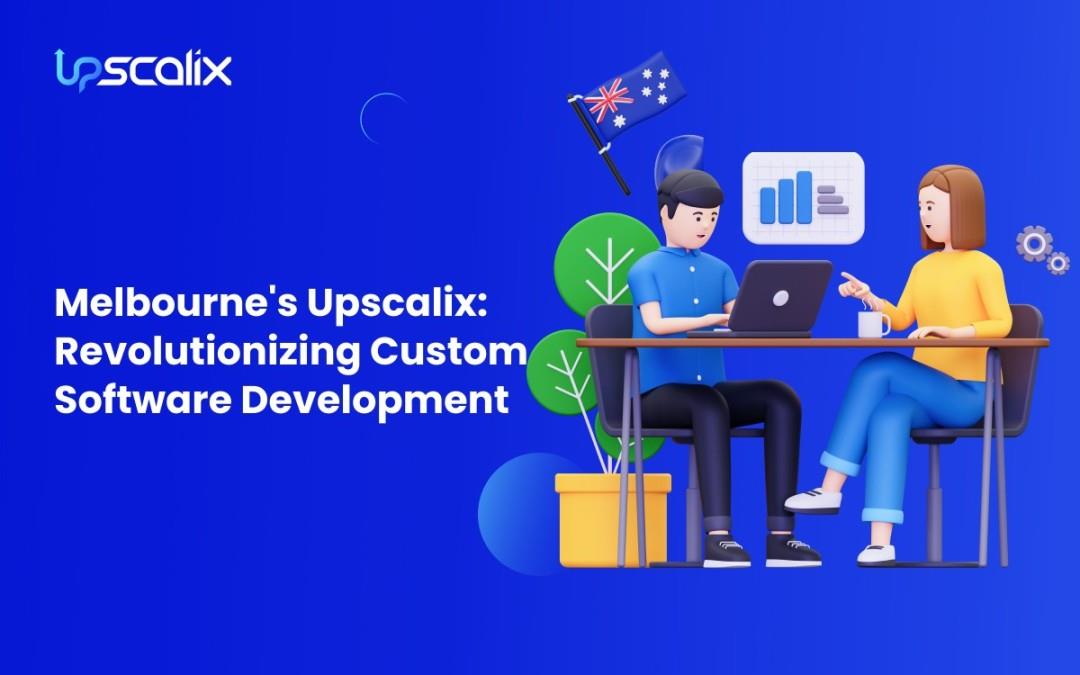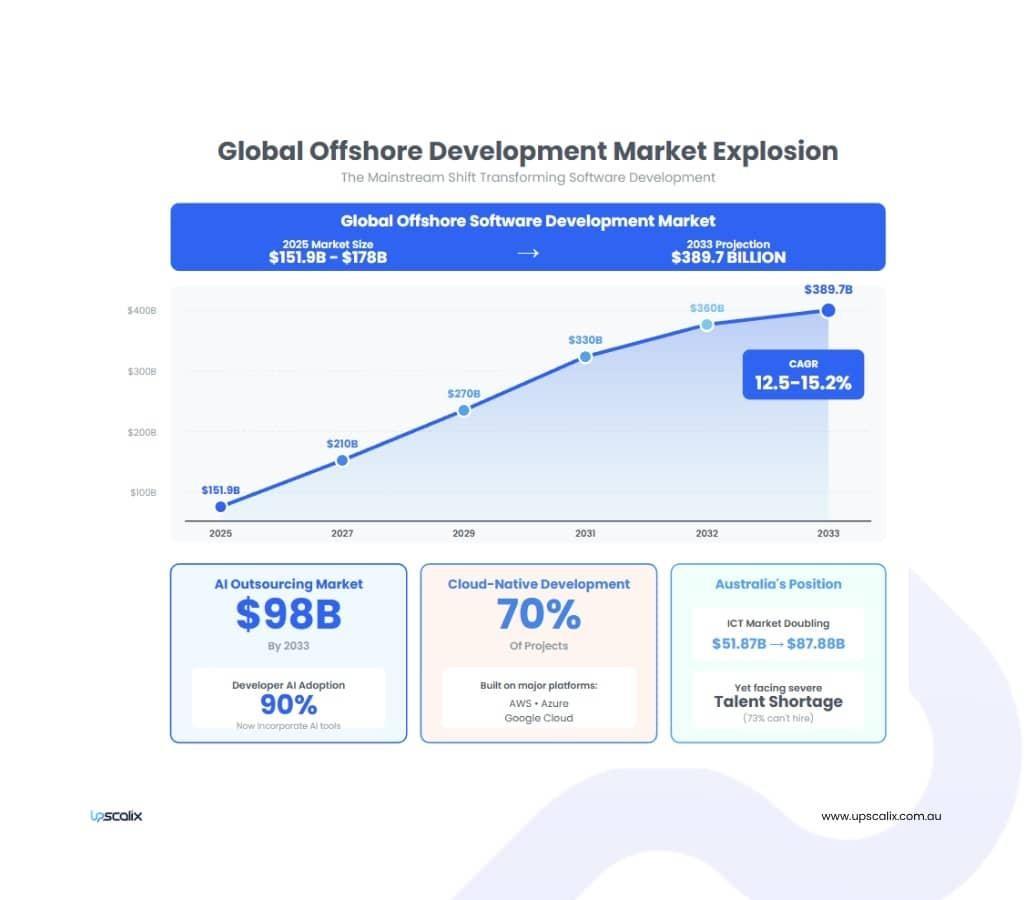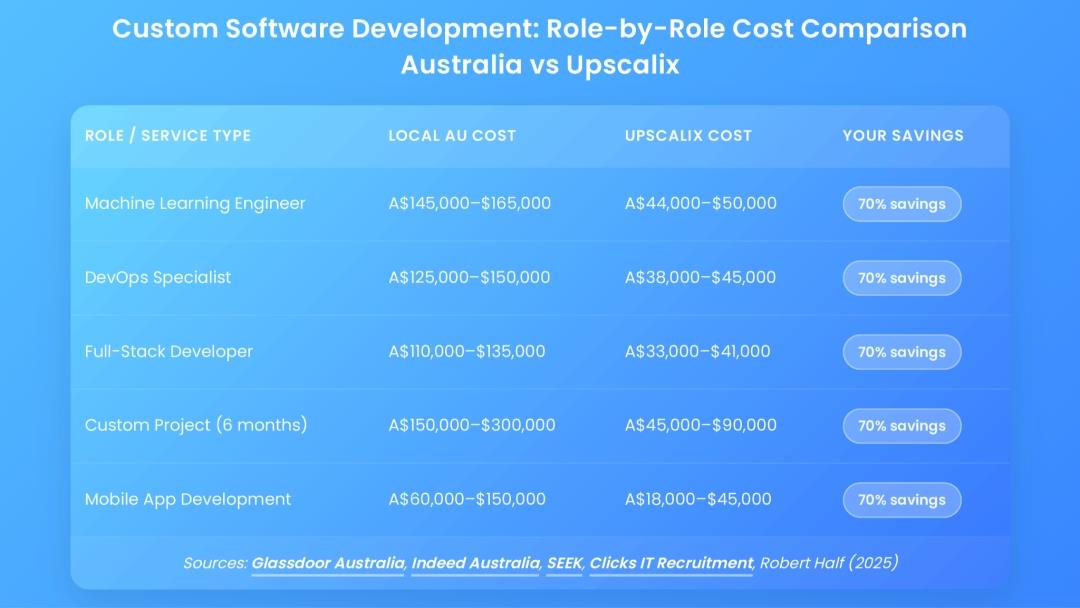
Melbourne's Upscalix Revolutionizing Custom Software Development

Let's talk about something that's been quietly reshaping how Australian businesses build software.
The tech talent shortage? It's absolutely cooked. Australia's ICT market is set to nearly double from $51.87 billion to $87.88 billion by 2032, yet 73% of businesses reckon they can't find the skilled developers they desperately need.
And it's not just any developers, the real bottleneck is in custom software development, where businesses need bespoke solutions but are stuck scrambling for talent that simply doesn't exist in the local market. That's not just a statistic, that's a genuine crisis for companies trying to grow.
Here's the reality check. Machine learning engineers are commanding roughly A$190,000 annually. DevOps specialists are pushing A$170,000. And that's before super, leave entitlements, and the six-month hiring slog that comes with finding local talent. The old-school recruitment model simply doesn't cut it anymore.
The old-school recruitment model simply doesn't cut it anymore.
Enter Upscalix, a Melbourne outfit operating from Level 11 at 580 Collins Street, and they're taking a different approach entirely.
The Core Proposition: Strategic Acceleration, Not Cheap Labor
Started in 2018, this offshore development company has grown from a two-person freelance gig to an award-winning operation connecting Australian businesses with Indonesia's top tech talent. But here's where it gets interesting, they're not flogging cheap offshore labor. They're selling strategic acceleration.
"Simply put, the old-fashioned way of recruiting locally doesn't scale anymore," says Roderich Hartono, Co-Founder and Managing Director. "We're seeing Australian businesses unable to access the critical technical talent they need, and when they can, the costs are prohibitive. When we deliver projects generating 50% more engagement and 70% more conversions, the ROI conversation completely changes."
That's a bold claim. But the track record suggests they might be onto something. Over 40 completed projects spanning digitized manufacturing operations, real estate management platforms hitting 90% tenant adoption, and IT services firms achieving 100% project completion rates across software engineering initiatives.
The breadth of services is genuinely impressive: custom mobile app development, web applications, e-commerce platforms, and even BPO support. It's comprehensive stuff.
How The Model Actually Works
The global offshore software development market is absolutely booming, projected to hit somewhere between $151.9 billion and $178 billion in 2025, with forecasts suggesting $389.7 billion by 2033. That's roughly 12.5% to 15.2% compound annual growth. Massive numbers.
The approach centers on what could be called "proximity-at-a-distance." They connect Australian businesses with pre-screened Indonesian developers, claiming access to 1,000+ English-proficient software developers averaging five-plus years' experience in Java, Python,.NET, React, and WordPress.
The value proposition includes:
Up to 70% cost savings compared to local hires
Teams working in Australian business hours
Customizable solutions for specific business needs
Transparent project management
Flexible engagement models
Whether it's custom software development for enterprise systems, fintech applications, or industry-specific platforms, the model scales to match project complexity from rapid MVP builds to full-scale digital transformation initiatives.
Wait, what about the timezone thing? Upscalix has this sorted, Indonesian time zones do overlap substantially with Australian business hours, providing genuine real-time collaboration opportunities. For urgent requests outside overlapping hours, they've got escalation protocols sorted. It's not identical coverage, but it's pretty close.
Here's something worth noting: developer churn rates stay below 2%. Some team members have been embedded with clients for over four years. Most offshore development centerrs struggle with turnover exceeding 20-30% annually, so if those figures hold, that's genuinely meaningful for business continuity.
Where Complexity Enters The Picture
Look, this isn't all sunshine and rainbows. There are legitimate considerations here.
First up, the talent curation claim. Recruiting from the "top 3% talent pool" sounds brilliant, but bridging technical competence with effective business communication requires ongoing investment in cultural training and communication frameworks. The company addresses this through English-proficient developers and ongoing cultural training programs, but it's something to keep an eye on.
Second, security and quality standards. When you're outsourcing IT services through an offshore development center, maintaining high standards becomes critical. The company emphasizes this commitment through client testimonials and project outcomes, but prospective clients should absolutely request detailed information about frameworks during consultation discussions.
Third, governance mechanisms. Suppose requirements evolve mid-project, how does the team handle scope changes? What's the change management process? These determine whether partnerships thrive or deteriorate.
Data sovereignty concerns matter too. Where does intellectual property reside? What happens during breaches? These aren't hypothetical questions.
Sources: Glassdoor Australia, Indeed Australia, SEEK, Clicks IT Recruitment, Robert Half, Arc, Plane Global HR, ERI SalaryExpert (2025)
The Bigger Picture: Capability Arbitrage
Here's what's really happening in the market. It's shifting from cost arbitrage toward "capability arbitrage." Companies aren't asking, "How cheaply can we build this?" They're asking, "How can we access specialized capabilities that improve our competitive position?"
Makes sense, right?
The global tech sector faces a projected talent shortage exceeding 85 million positions by 2030. Australia faces particularly acute shortages in AI development, cloud architecture, and cybersecurity. Businesses simply cannot rely exclusively on local hiring anymore.
Meanwhile, AI-augmented teams are changing everything. Ninety percent of developers now incorporate AI tools. The AI outsourcing market alone projects $98 billion by 2033. Cloud-native development dominates as well, with 70% of projects built on AWS, Azure, or Google Cloud.
Any company claiming to revolutionize custom software development needs demonstrable expertise across these emerging technologies.
The Practical Approach
For businesses evaluating this model, starting with pilots makes sense. Rushing to outsource mission-critical applications before proving the model is risky, regardless of how compelling the pitch sounds.
Cultural alignment matters beyond basic English proficiency. Effective developers don't merely write code, they understand business problems. That requires business acumen that takes time to develop.
All told, Upscalix represents thoughtful evolution in offshore software development tailored for Australian businesses. Their emphasis on transparent processes, customizable service, and flexible solutions addresses real pain points. The commitment to unlocking new opportunities, combined with reported retention metrics, suggests execution capability beyond typical marketing claims.
This approach represents significant evolution in offshore software development, particularly for businesses seeking partnerships that balance cost efficiency with quality and communication excellence.
For businesses ready to transform their approach to custom software development, Upscalix offers a pathway combining cost efficiency, quality delivery, and seamless collaboration. Their transparent process and flexible engagement models make it straightforward to start with pilot projects and scale as confidence builds.
Upscalix
Level 11/580 Collins St, Melbourne VIC 3000, Australia
FAQ
1. How is Melbourne's Upscalix revolutionizing custom software development?
By connecting Australian businesses with Indonesia's top 3% of tech talent, delivering up to 70% cost savings whilst maintaining quality through timezone alignment and low churn rates below 2%. They shift the focus from cheap labor to strategic acceleration, addressing Australia's critical tech talent shortage, where 73% of businesses struggle to find skilled developers.
2. What makes Upscalix different from traditional offshore development companies?
Upscalix focuses on strategic acceleration rather than cheap labor, connecting Australian businesses with Indonesia's top 3% of tech talent. They offer timezone alignment, English proficiency, and remarkably low developer churn rates below 2%, compared to the typical 20-30% turnover at most offshore development centers.
3. What types of services does Upscalix offer?
Upscalix provides custom mobile app development, web application services, e-commerce website development, and business process outsourcing (BPO) support. They offer flexible engagement models with either dedicated teams or project-based solutions, having completed over 40 projects across diverse sectors.

Legal Disclaimer:
MENAFN provides the
information “as is” without warranty of any kind. We do not accept
any responsibility or liability for the accuracy, content, images,
videos, licenses, completeness, legality, or reliability of the information
contained in this article. If you have any complaints or copyright
issues related to this article, kindly contact the provider above.



















Comments
No comment